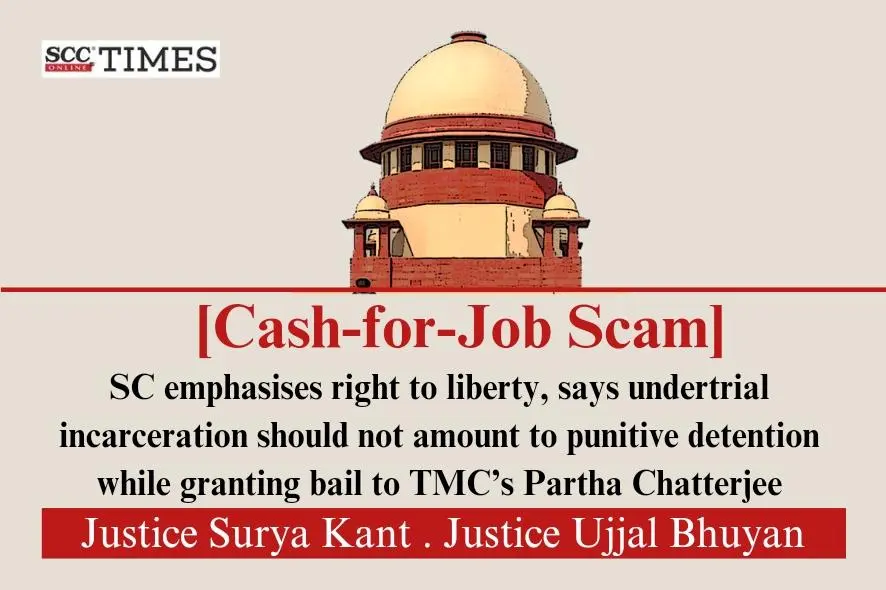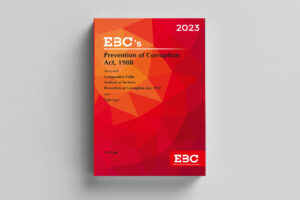Supreme Court: In a criminal appeal by Partha Chatterjee, a Member of the West Bengal Legislative Assembly since 2001, assailing a decision of the Calcutta High Court, whereby his bail application for involvement in various investigations, owing to the racket of illegal appointment of unmerited candidates to various posts, was rejected, the Division Bench of Surya Kant and Ujjal Bhuyan, JJ. directed to release Partha on bail on 01-02-2025, after the Trial Court records the statements of prosecution witnesses and examines them.
Background
Partha was a member of the State’s ruling party at the relevant time and held the post of Education Minister. During his tenure, recruitments to various posts of Primary School Teachers; Assistant School Teachers; Group C staff; and Group D staff, took place from time to time.
Writ petitions were filed before the High Court questioning the legitimacy of the procedures followed in the recruitments. Proceedings were initiated by unsuccessful candidates in the Teachers Eligibility Test (TET) conducted by the West Bengal Board of Primary Education (WBBPE), alleging corrupt practices in the recruitment process of Primary School Teachers. The High Court directed the Central Bureau of Investigation (CBI) to conduct a thorough investigation into the matter and also to register a case in this regard. Consequently, the CBI registered FIR under Sections 7, 7A and 8 of the Prevention of Corruption Act, 1988 (PC Act), as well as Sections 120-B, 420, 467, 468, 471 and 34 of the Penal Code, 1860 (IPC), against certain functionaries of the WBBPE. Following the predicate FIR registered by the CBI, ED took cognizance and registered ECIR on 24-06-2022, against the office bearers and a private individual, containing the same allegations as in the CBI Case. On this basis, a prima facie case for the offence of ‘money laundering’ under Section 4 of the Prevention of Money Laundering Act, 2002 (PMLA) was made out.
Raids were conducted by the ED at Partha’s premises and his close associates, where cash amounting to Rs. 21.90 crores and gold jewellery amounting to Rs. 76,97,100/- was seized and further searches also led to recovery of Rs. 27.90 crores and gold amounting to Rs. 4.31 from the companies that de facto were stated to belong to Partha, where he had allegedly appointed dummy directors.
Subsequently, Partha was arrested by ED on 23-07-2022. The bail applications before the Trial Court, as well as the High Court, came to be rejected.
Decision
At the outset, the Court reiterated that prolonged incarceration of an accused awaiting trial unjustly deprives them of their right to personal liberty. Even statutory embargoes on the grant of bail must yield when weighed against the paramount importance of the right to life and liberty under Article 21 of the Constitution, particularly in cases where such incarceration extends over an unreasonably long period without conclusion of trial. The Court also reiterated that the grant of bail must be determined based on the unique circumstances of each case, balanced against settled factors such as the gravity of the offence, the nature of the allegations, the likelihood of interference with the ongoing investigation, the possibility of evidence tampering, threat or influence over the material witnesses, the societal impact of such release, and the risk of the accused absconding among others.
In light of these settled positions, the Court said that Partha’s position as a Minister does not hold merit from either perspective. The Court explained that- “impartiality is a prerequisite to the Rule of Law, wherein decisions are based on the factual matrix of the case as opposed to the individual’s position or influence. While an accused person’s official status should not be grounds for denying bail, it also cannot constitute a special consideration to grant bail if otherwise no case is made out to provide such relief. Official positions, regardless of their stature, lose their relevance to exercise judicial discretion judiciously.
Without addressing the question of the evidentiary value of the statements recorded under Section 50 of the PMLA, the Court pointed out that the statements of close associates assumed enormous significance, as it constitutes prima facie evidence linking Partha to substantial heaps of bribe money recovered from the associate’s residence and company premises.
However, considering that the suspect cannot be held in custody indefinitely and that undertrial incarceration should not amount to punitive detention, the Court directed that Partha be released on bail, subject to following directions and conditions:
-
Since the charge sheet in the ED Case has already been filed but charges are yet to be framed, the Trial Court to decide on framing of charges before the commencement of the winter vacations and/or before 31-12-2024, whichever is earlier;
-
The Trial Court shall thereafter fix a date within the second and third week of January 2025 for recording the statements of such prosecution witnesses who are the most material or vulnerable. All such witnesses, especially those who have expressed apprehension of danger to their lives (who might be two or three), will be examined on these dates;
-
Partha and his counsel to extend full cooperation to the Trial Court for the recording of statements of these witnesses;
-
The witnesses will be examined without prejudice to Partha’s right to challenge the decision on framing of charges if the decision is adverse and if he is so aggrieved. However, upon such challenge, no stay on trial shall be granted;
-
If the examination of these witnesses is not completed on the dates fixed due to unforeseen circumstances, the Trial Court may do so lastly in the third and fourth week of January 2025;
-
Partha shall thereafter be released on bail on 01-02-2025, subject to his furnishing bail bonds to the satisfaction of the Trial Court;
-
If the Trial Court is able to complete the directions at an earlier date, then Partha may be released on bail immediately thereafter and before the given date of 01-02-2025;
-
Any attempt made by him to influence or threaten the witnesses, directly or indirectly, shall entail cancellation of the relief of bail;
-
Partha shall appear before the Trial Court on every date of hearing, and no unnecessary adjournment shall be sought on his behalf. If he is found involved in prolonging the trial, it shall be taken as a valid ground for cancellation of bail; and
-
He shall not be appointed to any public office (except that he shall continue to be a Member of the West Bengal Legislative Assembly) during the pendency of trial.
[Partha Chatterjee v. Enforcement Directorate, 2024 SCC OnLine SC 3729, decided on: 13-12-2024]









